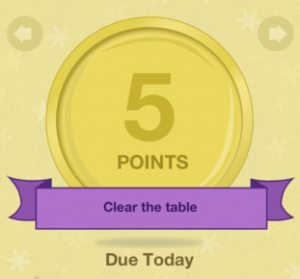 As an adult, you sometimes just have to get things done, and situations undoubtably arise where no incentive or reward exists. Your conscience acts as the only compass. It’s part of what defines us as responsible, ethical contributors to society, and enables us to make the right decisions even if they are less materialistically substantial.
As an adult, you sometimes just have to get things done, and situations undoubtably arise where no incentive or reward exists. Your conscience acts as the only compass. It’s part of what defines us as responsible, ethical contributors to society, and enables us to make the right decisions even if they are less materialistically substantial.
Teaching our kids these complex concepts requires time and effort. Websites like Choremonster seek to sidestep the dialogue by creating a virtual universe of prizes and rewards to keep kids entertained while doing the household grunt work.
Based in Cincinnati, Choremonster is a web and mobile application that aims to make chores fun by allowing kids to trade work like cleaning their room for prizes, cash, and virtual, collectible monsters. The website contains two portals, one for parents and one for kids. The parents log in to assign chores and the appropriate reward. The kids then do the chore and collect their prize.
While this system eases the burden off the parents’ end, do we run the risk of losing an integral part of growing up? That is, the true meaning of responsibility?
As parents, we strive to impart this lesson by showing kids that behind every action there is a motive and a repercussion. It is not always about what’s in it for them, but also about what’s best for society as a whole. Take for example feeding a pet. When your child feeds the pet, they do more than just carry out a task. They learn that this little animal relies on their diligence, and that the real ‘incentive’ is to prolong that animal’s life because of love.
Rather than holding the child accountable for that pet’s life, Choremonster turns the task into a game, and the price of that life no longer fits in the equation. Children jump from task to task, their relish for work driven by the prize rather than the actions’ ramifications.
Raising someone to believe that only prize-driven work matters creates many red flags. After all, how many of our future employers will feed us ice cream cones every time we do a good job? By promising rewards for something as trivial as doing the laundry, we condition our kids to expect something in return. We raise complacent little monsters. This sense of entitlement leads to unhealthy habits as adults. Unfortunately, Choremonster is doing just that.
I decided to see for myself how the website works and registered as a mother. A friendly purple monster named Frank immediately prompted me to add my children’s names, user names, genders, and ages (credit bythewood). After selecting chores that ranged from making the bed, picking up toys, and doing laundry, I had the choice to choose prizes for their completion.
At this point, I stopped and asked myself why a kid would ever want to set the table. Could parents teach them that setting the table is an important precursor to enjoying an intimate family dinner together, and thus carries intrinsic value? I could not help but feel, as I continued on to the next screen — which prompted me to add how many points the chore is worth, as well as what reward it merits (ice cream, a new Xbox?) — that I was in some way outsourcing my responsibility as a parent.
I was in essence trading good life lessons for goodies. After all, once the chores are done, how many parents actually take the time to tell their kids that even though they got a prize, it’s not about the prize at all? What kid would buy that?
This over-simplification of how the world works could potentially transcend the innocent realm of childhood chores and carry us into adulthood. Having conditioned ourselves to receive a little prize or treat every time we do something good, like little puppy dogs, will we see life as one big game, where, rather than learning to care for your home because it is your home, it’s just about what you get in return?
I hope I’m wrong.







